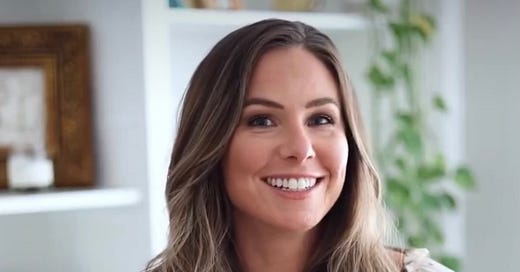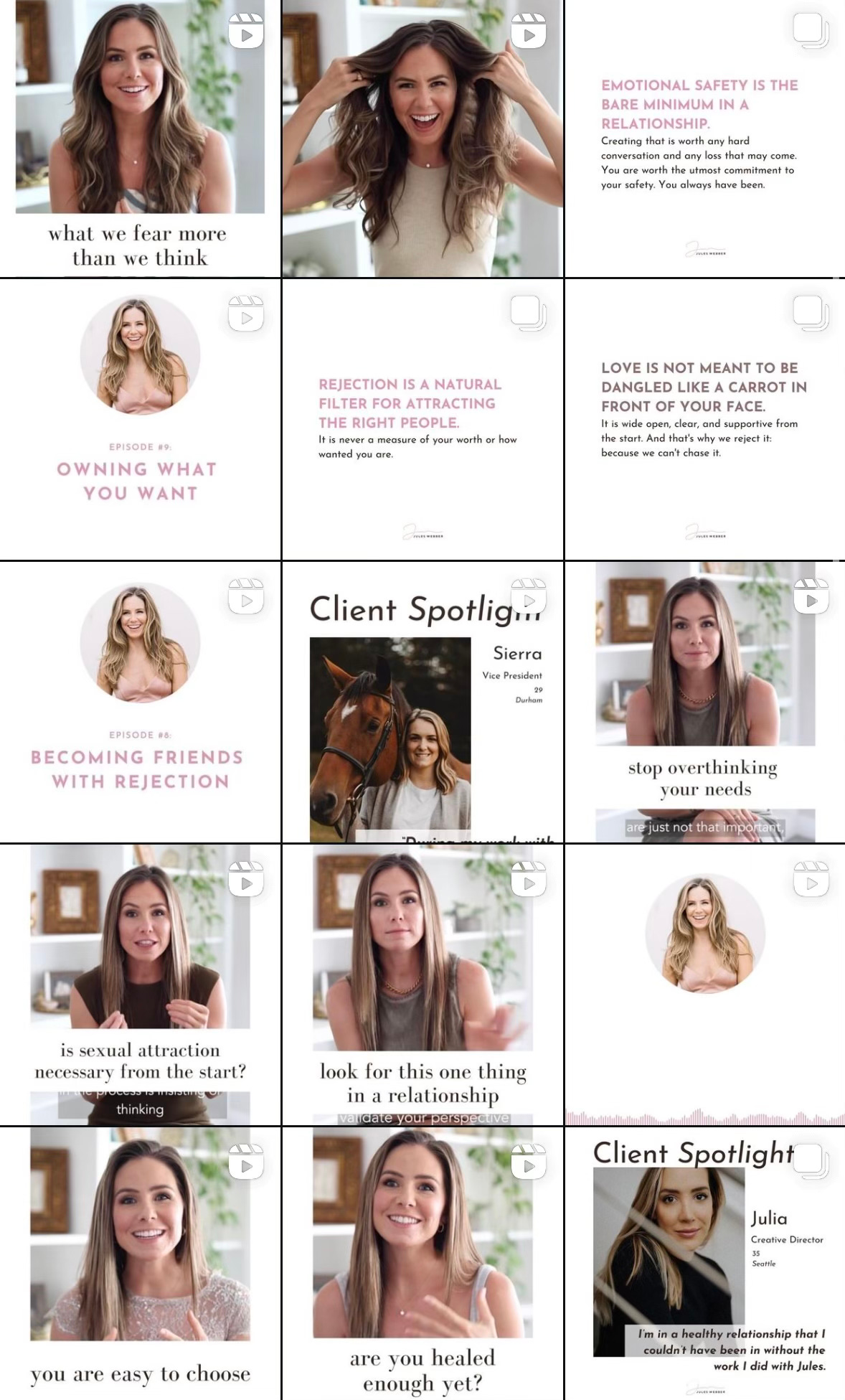Nine months ago I quit. As a social media influencer. As a content creator. Six years of daily sharing with my online community and I did it with little fanfare.
I wrote a quick message in my Instagram stories for the three to five percent of my audience who might see. I told them there was other work I wanted to do. I told them that I was grateful for them, and I was. The messages of the impact my content had on their lives made me rethink my choice. Just for a second.
I quietly archived hundreds of posts, one by one.
I changed my bio line. Wrote something about being a mom in Austin.
Switched my public account to private.
Updated my profile photo.
And… that was that.
It took me 30 minutes to shut off a valve that had both watered me and sucked me dry since 2018. The demand for free content at the drowning, all-consuming pace of a fire hydrant had outpaced my creativity. My desire. My soul. As the creator of a brand based on my own thought leadership, where I spoke to a camera in a one-sided conversation, and depended on engagement (re: validation) metrics for the success or failure of my business, the mental load had caught up with me.
I don’t know what I had been expecting, but there was a feeling of free fall. The thing that I both depended on and resented had disappeared before my eyes. “How Gen-Z of you,” my boyfriend Nate told me when he saw my Instagram empty of posts, the characteristic yet trending look of someone starting fresh; wiping the slate clean.
I wasn’t a brand anymore. I was just a person. My brilliant mentor, Amy Jo Martin, says, “You don’t brand yourself. You are yourself.” In the world of business, I took that to heart. And to the bank. In my mental health, I was objectifying myself and I desperately needed to separate Jules the human from Jules the brand.
In 2018 I started writing on Instagram about relationships, healing, and random thoughtfulness. I’d post a much-too-curated photo because that was what we did back then, and my 90 or so followers would see it, maybe give it a like or a supportive comment. Later on I started to write and then teach about relationships, communication, codependency, and eventually career transitions, politics, dating apps, style, you name it. My account grew to a very average size for an influencer, about 12,000 followers, and from there I built a lucrative business that led to a blog, podcast, press, and social influence, to say nothing of the thousands of lives changed through my work. I loved my work and was overwhelmed by the brand.
The algorithm changes at Instagram over the last several years affected my business as much as anyone else’s. Because only a small fraction of my audience was seeing my content, I had to make more of it in order to drive meaningful conversations, let alone conversions. As a content creator, I made valuable educational tools for people that had real impact on their lives whether they paid me or not. When Instagram forced me to double or triple the amount of content in order to reach them in the first place, I felt I’d been saddled in a codependent relationship with a company that had no interest in reciprocating, or even supporting, the valuable content I shared that was completely free to their platform. It’s deflating to pour your heart into something that your audience will hardly see, even after they’ve opted into your content by following you.
So nine months ago, I followed the advice I’d been giving women for years in my practice as a Relationship & Executive Coach, and I broke up with Instagram.
Instantly, I felt as though I’d lost 200 pounds. And the feeling wasn’t unlike when I got divorced, or when you leave an exhausting job, or finally start feeling better after an illness. This thing that created a mental load that felt unbearable sometimes was suddenly gone.
I had 90% more space in my brain. I stopped looking into a camera on a daily basis and dissecting my appearance. I no longer needed to be aspirational to anyone, or gather up moments of my personal life to create content for an audience. I would spend time with my kids and not record anything. I would eat out and enjoy the food without posting about it. I returned to the most mundane things like my garden, reading, or not wearing makeup for a few days. I didn’t feel so behind anymore. I reveled in my privacy. I just felt lighter.
And even more… I’ve recovered from creativity burnout and I’m ready to write again. This time, with the same thought and care as before, but with more reciprocity. Instead of selling ads on Instagram, a podcast, or YouTube, I’ve moved to Substack where readers opt-in to either free content or paid. It’s that simple. Creators are compensated, and readers know exactly what they are getting, without wondering if the voice of the person they are reading is bought and paid for in a way that is not openly stated. And when you subscribe to this newsletter, you’ll be notified when I post.
So thank you for being a subscriber. Thank you for participating in the value exchange that makes creating content sustainable for me.
In the Spring of 2022 I went through several crisis in the same week that revealed to me just how much stress I had been under since the pandemic had begun. For nearly three years I raised my two young children the majority of the time while also being their primary financial provider. When the world shut down in 2020, what was already a difficult role had become nearly impossible without access to a support system. Two years later when I went through a breakup, a family health crisis, and a custody crisis all in the same week, I completely spiraled. I felt alone, burdened, afraid, and searched around every corner for a tragedy to strike in the way that I had when my daughter had been born dangerously early as a mircopreemie. My psychologist diagnosed me with PTSD and I realized that the isolation and independence which had become normal to me was making me dangerously fragile. More on that in a future post.
I started to understand my digital world as something that was seemingly keeping me connected to people, but also isolating me from them. Sharing highlights and even vulnerabilities (albeit highly controlled) led people to think they knew what was going on with me just by visiting my page. My relationships were more online than in person, and I had this nagging dissatisfaction that DMs and likes were beginning to replace hugs, phone calls, and checkins. I imagine a lot of us felt that way during 2020 and beyond.
The microcosm of celebrity created by influencer culture leads many of us to believe we personally know the people we follow on the internet. Para-social relationships, while entertaining and even validating, aren’t as real as they can sometimes feel. In the larger sense, I was beginning to see my constant engagement online as damaging to the genuine relationships and intimacy I craved. When people had access to me online, even if it was only an illusion, they didn’t reach out personally as much. And without much in-person community to speak of as a result of my post-pandemic terminally online existence, I kept leaning into digital interactions, substituting dopamine-driven hits of validation for actually feeling seen and cared for. I told myself for years that I wouldn’t be able to have a business without social media. I told myself I needed the relationships that weren’t really relationships. I posted my kids online, eventually feeling I was violating their consent, and realized this, like so many other aspects of my life, was not sustainable. I was giving away my privacy for free, all in exchange for attention, and the hope of having a business that could help people and support my family.
My own personal leanings and history with codependency made this a toxic cocktail of maladaptive habits that eventually were too intrusive and cumbersome to ignore. Maintaining a personal brand as an influencer had become more harmful to my mental health than it was rewarding, and my real life needed the presence and attention I so often gave to strangers on the internet. I didn’t have a plan B lined up. There was no job waiting for me if I obliterated the thing I told myself I needed to have a stable business. But I knew in my body that if I just stopped, there would be rest.
The last nine months I’ve spent living the relationship advice I used to dole out, and continuing to support my coaching clients. Many have asked if I still offer Dating, Relationship, and Executive Coaching, and the answer is yes, but through word of mouth these days. If you want to reach out, you can send an e-mail to hello@juleswebber.com. Oh and don’t worry. I’ll be resharing all my archived dating and relationship videos here from time to time, so stay tuned!
My career supporting women through a Trump presidency, pandemic, and the overturning of Roe v. Wade has also shifted my interest. I’ll be talking a lot more about politics now. You’ll see me offering thoughts on our political divide, the role journalism and algorithms play in that, what you can do as a voter and citizen, and how to brave vulnerable conversations with each other.
Check back here for the latest, as always. I’ll be posting to Instagram here and there but any significant developments will always be posted on Substack so you don’t miss anything.






